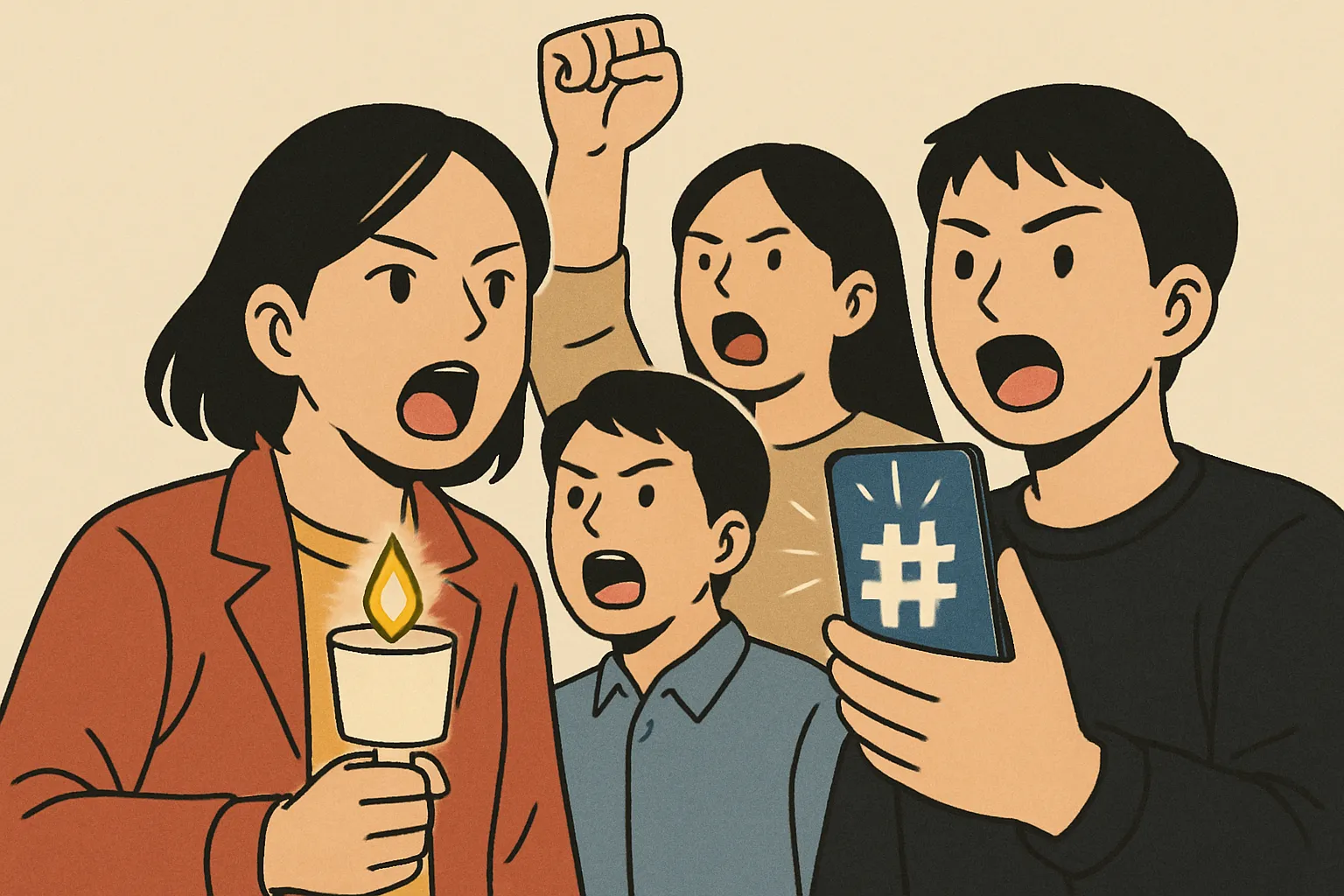Level Up Your Korean: How to Disagree Like a Pro in Debates! 🎓
Hello! This is [Maeil Hangeul], here to upgrade your Korean skills!
Have you ever been in a university debate, a team meeting, or just a conversation where you wanted to express a different opinion but didn’t know how? Today, we’re going to learn how to raise counterarguments and rebuttals in Korean. This isn’t just for academic essays; it’s a crucial skill for expressing your thoughts clearly and logically in any discussion.
Recently in Korea, there’s a huge emphasis on critical thinking and debate skills, not just in schools but also in popular K-dramas featuring sharp lawyers and brilliant doctors. So, let’s learn how to sound just as smart and persuasive as them!
Core Expressions for a Smart Rebuttal
Here are three essential phrases that will help you disagree politely and effectively.
1. 그 말씀도 일리가 있지만… (What you said has a point, but…)
- Pronunciation [Romanization]: Geu malsseumdo illiga itjiman…
- English Meaning: That makes sense, but… / I see your point, however…
- Detailed Explanation: This is a fantastic way to start a counterargument politely. By saying “일리가 있다” (to have a point/to make sense), you first acknowledge and validate the other person’s opinion. This softens your disagreement and shows that you are listening carefully before presenting your own view. It’s perfect for both formal presentations and casual discussions.
-
💡 Pronunciation Tip:
The final sound of있(it) is a ‘t’ sound. When it’s followed by지(ji), the sounds blend. Instead of sayingit-ji-man, Koreans pronounce it as [it-jji-man], with a tensed ‘jj’ sound, almost like a ‘tch’ in English. This tensing rule makes your pronunciation sound much more natural!
2. 제 생각은 좀 다릅니다. (My opinion is a little different.)
- Pronunciation [Romanization]: Je saenggageun jom dareumnida.
- English Meaning: I think a little differently. / My opinion differs slightly.
-
Detailed Explanation: This is a direct yet polite way to state that you have a different viewpoint. The word 좀 (jom), meaning “a little,” is key here. It acts as a cushion, making the statement less confrontational than saying “My opinion is different.” (제 생각은 다릅니다). It’s a standard and respectful phrase used widely in workplace meetings and academic settings.
-
💡 Pronunciation Tip:
Notice the last part,다릅니다(dareumnida). The syllable답would normally be pronounced with a ‘p’ sound at the end. However, when 받침 ‘ㅂ’ (b/p) is followed by ‘ㄴ’ (n) or ‘ㅁ’ (m), it changes to an ‘ㅁ’ (m) sound. This is called nasalization. So, instead ofda-reup-ni-da, it is pronounced smoothly as [da-reum-ni-da]. The same rule applies to감사합니다(gamsahamnida)!
3. 그 주장은 …라는 점을 간과하고 있습니다. (That argument overlooks the point that…)
- Pronunciation [Romanization]: Geu jujangeun …raneun jeomeul gangwahago itseumnida.
- English Meaning: That argument is overlooking the fact that…
-
Detailed Explanation: This is a more advanced and formal expression, perfect for academic writing, presentations, or formal debates. 간과하다 (gangwahada) means “to overlook” or “to neglect.” By using this phrase, you are pointing out a specific flaw or a missing piece in the other person’s logic. It shows you have a deep, critical understanding of the topic.
-
💡 Pronunciation Tip:
In the word간과(gangwa), the pronunciation is straightforward. However, focus on the formal ending~고 있습니다(go itseumnida). Remember the nasalization rule from before? The ‘p’ sound in습니다changes to an ‘m’ sound, making it [isseumnida], notisseupnida. Mastering this will make your formal Korean sound incredibly polished.
Example Dialogue: University Team Project Meeting
Let’s see how these expressions work in a real conversation! Two students, A (Sumin) and B (Minjun), are discussing their history project.
A (수민): 우리 프로젝트 주제로 ‘조선시대의 과학 기술’을 집중적으로 다루는 게 어때? 자료도 많고 재미있을 것 같아.
(How about we focus our project topic on ‘Science and Technology of the Joseon Dynasty’? There are a lot of resources, and I think it would be interesting.)
B (민준): 그 말씀도 일리가 있지만, 그 주제는 너무 흔해서 좋은 점수를 받기 어려울 수도 있어요.
(I see your point, but that topic is so common that it might be difficult to get a good grade.)
A (수민): 아, 그런가? 그럼 민준 씨는 어떤 아이디어가 있어?
(Oh, really? Then what’s your idea, Minjun?)
B (민준): 제 생각은 좀 다릅니다. ‘조선시대 여성들의 사회적 역할’은 어떨까요? 기존의 주장은 여성의 역할을 과소평가하는 점을 간과하고 있습니다. 우리가 새로운 시각을 제시할 수 있을 거예요.
(My opinion is a little different. How about ‘The Social Roles of Women in the Joseon Dynasty’? Previous arguments overlook the point that women’s roles were underestimated. We could present a new perspective.)
A (수민): 와, 그거 정말 신선하고 좋은데? 그렇게 하자!
(Wow, that’s a really fresh and great idea! Let’s do that!)
Culture Tip & Trend Deep Dive 🇰🇷
In Korean culture, maintaining harmony (조화) and saving face (체면) is very important, even during disagreements. That’s why expressions like “그 말씀도 일리가 있지만…” are so common. You show respect for the other person’s idea before introducing your own.
You’ll see this in action everywhere! In Korean business meetings, employees will rarely say “That’s wrong” (틀렸어요) to a superior. Instead, they’ll use “제 생각은 좀 다릅니다” to gently propose an alternative.
K-Drama Connection: Watch any legal or medical K-drama like Extraordinary Attorney Woo or Dr. Romantic. When the brilliant main characters challenge a senior colleague’s diagnosis or a prosecutor’s argument, they often use these exact phrases. It shows their intelligence while maintaining a level of professional respect. Using them will make you sound not just fluent, but culturally aware, too!
Let’s Wrap It Up & Practice!
Today, we learned three powerful ways to express counterarguments in Korean:
- 그 말씀도 일리가 있지만… (To agree with a point before disagreeing)
- 제 생각은 좀 다릅니다. (To politely state a different opinion)
- 그 주장은 …라는 점을 간과하고 있습니다. (To formally point out a flaw in an argument)
Now it’s your turn to practice!
1. Fill in the blank:
Your friend says, “K-pop is only popular because of the idols’ looks.” You want to disagree by mentioning their musical talent. How would you start your sentence?
그 말씀도 일리가 있지만, 아이돌들의 ______도 무시할 수 없어요.
(a) 음악적 재능 (musical talent)
(b) 재미있는 성격 (fun personality)
2. Make a sentence:
Imagine your team leader suggests working over the weekend to finish a project. You think taking a rest and starting fresh on Monday is more efficient. How would you express your opinion using “제 생각은 좀…”?
Leave your answers in the comments below! I’d love to see how you use these new expressions. Keep up the great work! 💪






